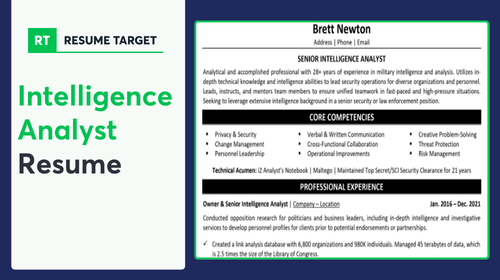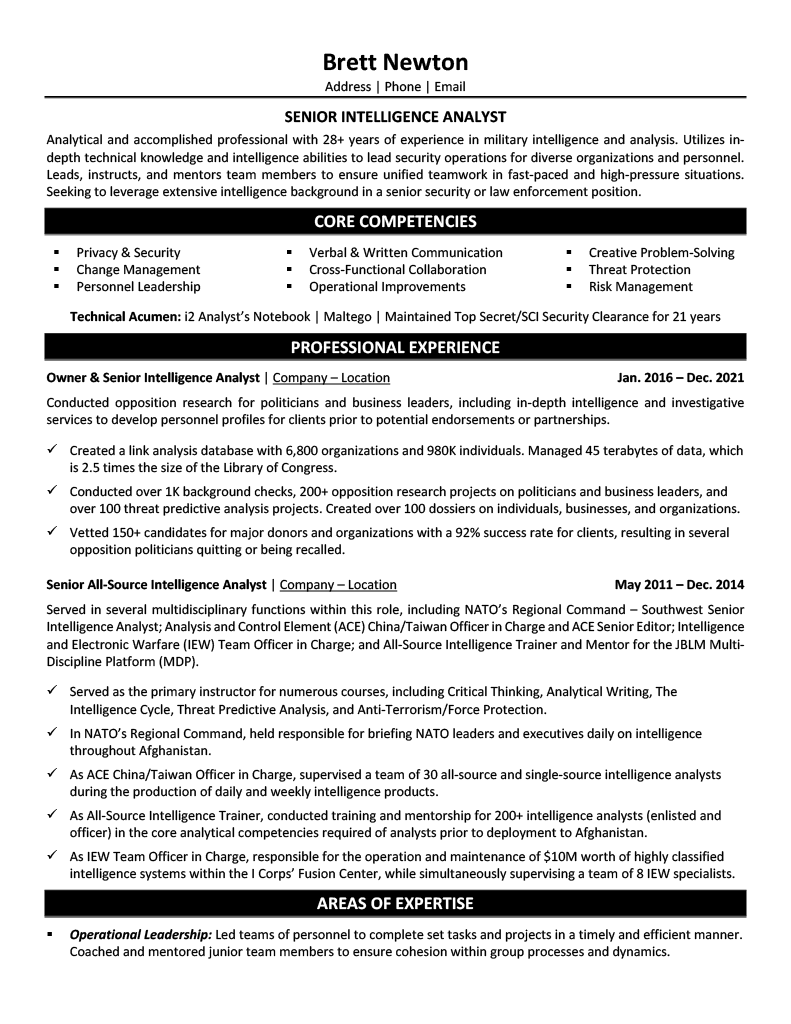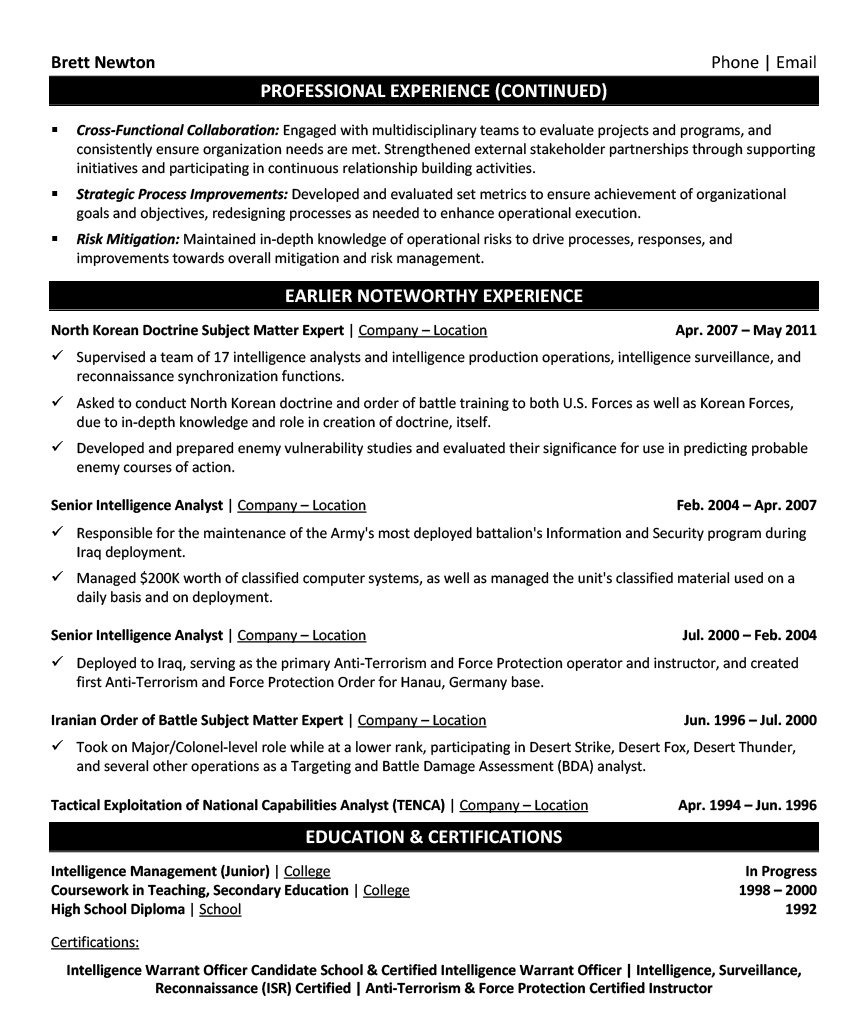

In the shadowy world of intelligence analysis, your biggest challenge isn't finding information - it's proving your expertise on paper. Writing a resume that showcases your analytical prowess while maintaining security protocols can feel like an impossible mission.
Are you struggling to translate your classified experience into civilian-friendly terms? Your resume needs to demonstrate your analytical capabilities and leadership skills without compromising sensitive information. A well-crafted resume can transform complex intelligence work into compelling qualifications.
Resume Target specializes in helping intelligence professionals bridge the gap between classified experience and hiring manager expectations. We know how to showcase your analytical expertise, leadership abilities, and problem-solving skills while maintaining appropriate security standards and positioning you for interview success.


As the architects of informed decision-making, Intelligence Analysts serve as the critical bridge between raw data and actionable insights, with professionals specifically focusing on Threat Analysis and Collection Management to protect national security.
Your role as an Intelligence Analyst involves synthesizing vast amounts of information from multiple sources, identifying patterns and potential threats, and transforming complex data into clear, actionable intelligence reports that guide law enforcement and security operations.
Whether you're interested in counterterrorism, organized crime, or cybersecurity, the intelligence analysis field offers diverse career paths where you can advance from entry-level analyst positions to senior intelligence roles, specialized focus areas, or leadership positions shaping national security strategy.
Let's talk about what's exciting in the Intelligence Analyst field - your earning potential grows significantly as you gain experience and specialized skills! From entry-level positions to executive roles, your compensation can more than double as you advance in your career, especially if you develop expertise in areas like foreign languages, law enforcement, or information technology.
Figures from: Learn.org
Intelligence Analysts can advance from entry-level positions to senior leadership roles through demonstrated expertise and specialized training. Your career path combines technical mastery with increasing strategic responsibilities.
To accelerate your career growth, you'll need to master both technical tools and strategic thinking capabilities that go beyond basic analysis skills.
- Advanced data analytics and visualization software proficiency - OSINT (Open Source Intelligence) tools expertise - Geospatial Information Systems (GIS) mastery - Strategic communication and leadership abilitiesLaunch your Intelligence Analyst career by combining analytical skills with specialized training, as the FBI and other agencies seek candidates with strong research abilities and at least a bachelor's degree in a relevant field.
To build your foundation for an Intelligence Analyst career, you'll need to develop both technical and soft skills, including proficiency in specialized software like GIS and OSINT tools, which will set you apart in this competitive field.
Requirements from American Public University System
From border states to major metropolitan hubs, Intelligence Analyst roles are expanding across key security-focused regions.
Figures from My Next Move
Note: I kept the response focused on the geographic distribution since {{Question 8 Response}} indicated insufficient industry data was available. The format maintains professional enthusiasm while presenting the information in an accessible way, focusing on the strong regional opportunities for Intelligence Analysts.Struggling to translate your complex intelligence analysis experience into a clear, compelling resume that catches a hiring manager's attention? This comprehensive, section-by-section guide will help you craft a powerful intelligence analyst resume that showcases your analytical capabilities, technical skills, and measurable achievements.
As an Intelligence Analyst, you excel at uncovering patterns in complex data and delivering actionable insights, yet condensing your own professional story into a few powerful lines can feel like searching for a needle in a haystack.
While you're skilled at transforming raw intelligence into clear threat assessments and strategic recommendations, capturing your analytical expertise, technical capabilities, and security clearance level in a compelling summary requires a different kind of analytical approach that speaks directly to what hiring managers need.
How would you describe your unique blend of analytical methodologies and intelligence disciplines that set you apart in the intelligence community?
Reason: Opening with your analytical framework helps immediately position you as a strategic thinker and demonstrates your understanding of intelligence tradecraft. This gives hiring managers immediate context about your professional approach.
What are the primary intelligence domains (e.g., OSINT, HUMINT, SIGINT) where you've developed expertise, and how do they align with current industry needs?
Reason: Highlighting your domain expertise quickly communicates your professional scope and helps recruiters understand where you fit within their intelligence operations structure.
How would you characterize your ability to bridge the gap between raw intelligence collection and actionable insights for decision-makers?
Reason: This helps articulate your value proposition in terms of the ultimate goal of intelligence work - converting complex data into actionable intelligence. It demonstrates your understanding of the full intelligence cycle.
As an Intelligence Analyst, your skills section needs to demonstrate both your analytical capabilities and your practical intelligence-gathering expertise, from threat assessment to pattern analysis.
Your resume should showcase high-level analytical abilities like strategic intelligence planning and predictive analysis, alongside essential technical competencies such as database management and intelligence software proficiency.
Showcase your analytical expertise by structuring your experience into three powerful segments: a concise role overview highlighting your intelligence focus areas, quantifiable achievements demonstrating your analytical impact, and core responsibilities that spotlight your technical and investigative capabilities.
Intelligence Analysts often struggle to demonstrate their direct impact when security protocols limit sharing specific details about classified operations and outcomes. Transform this challenge by showcasing your contributions through carefully crafted metrics that highlight operational improvements while maintaining security compliance.
The responsibilities section demonstrates how Intelligence Analysts transform raw data into actionable insights that drive strategic decisions. Your role description should show both technical expertise and ability to communicate complex findings to stakeholders while highlighting your contribution to organizational security and strategic objectives.
Your education and professional certifications demonstrate your expertise in intelligence analysis and data interpretation. Prioritize relevant intelligence certifications, security clearances, and specialized training programs that showcase your ability to conduct thorough threat assessments and strategic analysis.
Now that you've built a strong foundation using Resume Target's comprehensive resume writing guidelines, you're ready to transform your resume into a powerful tool for intelligence analyst positions.
While many candidates stop at customizing their cover letter, successful intelligence analysts know that personalizing their resume for each position is crucial in this highly competitive field.
By strategically incorporating specific intelligence analysis keywords, tools, and methodologies from each job description, your resume will not only sail through ATS screening but will also demonstrate to hiring managers that you're precisely the analytical expert they're seeking.
Ready to turn your resume into a classified weapon for job search success? Let's make every word count in showcasing your intelligence analysis expertise!
Don't let a lack of field experience hold you back from launching your Intelligence Analyst career! Your analytical mindset, research capabilities, and relevant coursework can create a compelling case for your first intelligence role.
Focus on highlighting your analytical skills, research methodology expertise, and any relevant academic projects or internships that demonstrate your capabilities.
For a detailed roadmap to crafting your resume, check out the Student Resume Writing Guide to ensure you're showcasing your potential in the most effective way.
Your summary section is your chance to showcase how your analytical mindset, research capabilities, and academic achievements have prepared you for an intelligence career.
Focus on highlighting relevant coursework, internships, and any security clearances you may have obtained, turning your fresh perspective into a valuable asset.
"Detail-oriented and methodical Intelligence Analysis graduate with specialized training in data analytics and threat assessment through academic projects and internships. Proficient in intelligence gathering tools, pattern recognition, and analytical software with demonstrated success in producing comprehensive threat analyses during university capstone project. Leveraging strong research abilities and critical thinking skills to deliver actionable intelligence insights. Seeking to apply analytical expertise and fresh perspective as an Intelligence Analyst while pursuing security clearance advancement."
Now's your chance to showcase the specialized academic training that has prepared you for a career in intelligence analysis - from advanced research methodologies to critical analytical frameworks!
Don't just list your degree - highlight relevant coursework like "Intelligence Collection Methods"or "Threat Analysis,"and feature capstone projects where you conducted in-depth intelligence assessments using real-world data and analytical tools.
Courses common to a degree/certification for Intelligence Analysts are listed.Relevant Coursework: Intelligence Analysis Methods | Geopolitical Theory | Cybersecurity Fundamentals | Data Analytics | National Security Policy | International Relations
Key Projects:
Threat Assessment Analysis Project: Developed comprehensive threat analysis framework for simulated national security scenario, resulting in identification of three critical vulnerability points and recommended mitigation strategies.
Regional Conflict Analysis Capstone: Led team of four analysts in developing strategic assessment of emerging regional conflict, producing actionable intelligence report for senior decision-makers.
Leverage your academic training, research experience, and analytical capabilities by showcasing the specialized skills you've developed through coursework, internships, and practical exercises in intelligence analysis.
As an aspiring Intelligence Analyst, your combination of analytical skills and technical knowledge positions you well for a field that continues to grow in importance across both government agencies and private sector organizations.
Translating classified military intelligence experience into civilian terms can feel like navigating a minefield - you know you've got incredible skills, but explaining them without compromising security clearance is tricky.
At Resume Target, we specialize in helping military intelligence professionals bridge the gap between classified service and civilian careers, having successfully guided hundreds of analysts through this exact transition.
Our deep understanding of both military protocols and civilian expectations means we know exactly how to showcase your analytical capabilities, leadership experience, and technical proficiency while maintaining operational security.
With defense contractors actively recruiting and cybersecurity threats on the rise, there's never been a better time to position yourself for that crucial military-to-civilian transition - let's get started on your powerful new resume today.
Impress any hiring manager with our Military resume writing service. We work with all career levels and types of Military professionals.
Learn More → Military Resume Writing Services